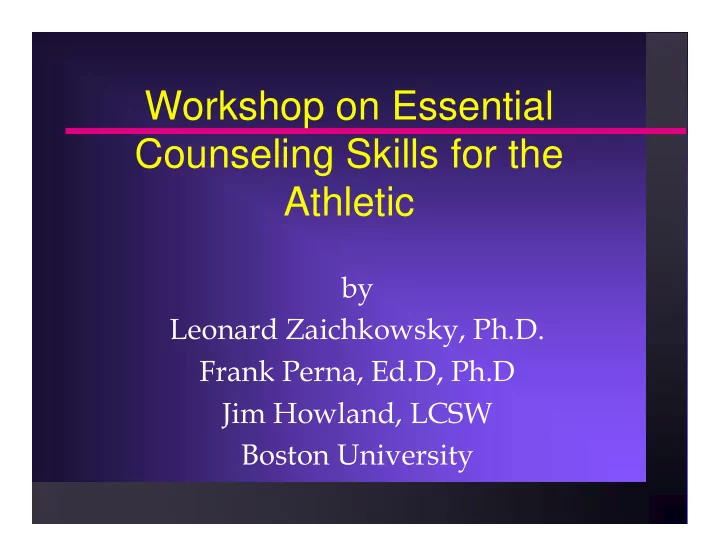

Workshop on Essential Counseling Skills for the Athletic by Leonard Zaichkowsky, Ph.D. Frank Perna, Ed.D, Ph.D Jim Howland, LCSW Boston University
Workshop Objectives Learn the range of psychological reaction to injury. � Recognize physical rehabilitation as an opportunity � to facilitate significant learning and development Identify critical self-regulation skills to be � developed during rehabilitation. Generate practical methods of facilitating critical � psychological skill development in injured athletes. Differentiate between typical emotional response to � injury, and more severe psychological distress. Understand the importance of referral to a mental � health counselor/psychologist
The Range of Injuries � “Simple”-quick recovery � To “Nasty” –long term recovery or career ending
Model of Appraisal of Injury and Adjustment Personal Factors Situational Factors (disposition/history) (environmental characteristics) Cognitive Appraisal (interpretation of injury) Emotional Response (anger, depression, relief) Behavioral Response (adherence to rehabilitation)
Psychological Process Models � Grief / thanatological � Cognitive appraisal/risk models � Emotional response � Appraisals � Events � Behaviors
Signs of Problematic Adjustment � Depression, confusion, apathy, mood swings, withdrawal � Obsession with playing again � Denial - “no big deal” � Dwelling on minor complaints � Feelings of guilt/letting the team down � Dependence on trainer or h b
Normal emotional responses TEMPORARY � Sadness � Feelings of isolation � Irritation � Neutral � Unmotivated � Frustration � Anger � Decrease in appetite � Minor sleep disturbance
Abnormal/Clinica Normal/Subclinical l Range Range Temporary Ongoing Sadness Depression Feeling isolated Withdrawal Irritated Explosive Neutral Numb Unmotivated Apathetic Frustration Frequent crying or emotional outbursts Anger Rage Change in appetite Rapid weight loss or gain, or disordered eating pattern
Rehab as an opportunity � Unique challenges � Achievement required, no awards � Personal accountability � Unique access � Daily � One-on-one � “present other” in struggling � Time
What’s the difference? � Injured athletes � Greater negative affect � Lower self-esteem � Higher levels of depression � Course of emotional state � From negative to positive � Degree of shift dependent upon actual & perceived rehab success
How & why you are KEY! � Perception of AHCPs by athletes � Robbins & Rosenfeld, 2001 – AT’s provide more support than coaches – AT’s social support � positive effects � Social support � Uncertainty reduction via supportive communication � Reduces : – Ambiguity – Complexity – Unpredictability � Provides: – Increased feelings of personal control – Realistic alternatives to a stressful situation Skill
Effective Communication � Good communication skills build trust, rapport, and respect � Establishment of a strong relationship � Active listening - clarifying/paraphrasing � Empower the athlete � Nonjudgmental empathy
Listening Support � Nonjudgmental listening � EX:
Psychological Skills Development � Perseverance � Patience � Positive self-talk � Communication � Courage � Goal setting & attainment � Engagement � Ownership/responsibility
Types of Social Support � Multidimensional concept � (Richman et al., 1993 )
Emotional Support � Provider acts in caring & comforting ways � Consistency � Believability � EX:
Emotional Challenge � Challenge made to athlete to help him/her evaluate attitudes, values, feelings � Accountability � EX:
Reality Confirmation Support � Confirming the athlete’s perspective on the situation � EX:
Task Appreciation Support � Appreciation of athlete’s efforts � EX:
Task Challenge Support � Perceived challenge of the athlete’s way of thinking about an activity to motivate him/her to greater involvement � Reframing � EX:
What does it take? � Courage � Connection � Communication
Referral � Have a counselor / psychologist in mind � Introduce the notion of a referral gently � Discuss what it might look like � Facilitate a first meeting
Some Skills Needed by Injured Athletes � goal-setting � decision-making � relapse prevention training � self-monitoring � stress management � use of social support
Recommend
More recommend